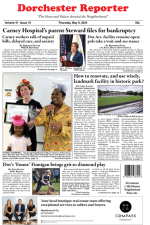March 22, 2023
Sixty years ago, the United States Supreme Court established the right to counsel across the nation, and that monumental decision was supposed to create a just and fair legal system for everyone – no matter their wealth. Every year, public defenders acknowledge the landmark Gideon v. Wainwright decision because its anniversary gives us a moment to publicly reflect on how far we’ve come while also acknowledging the very real issues that continue to plague our clients and society at large.
The Gideon decision in 1963 reaffirmed what Massachusetts had long understood – criminal defendants could not receive a constitutionally fair trial without a lawyer representing them. Bay State attorneys have been assigned to defendants in serious cases since the 1790s, and ever since, indigent defense has grown here faster than in most other parts of the country.
Today, the right to counsel extends beyond adult criminal and juvenile justice cases. We provide representation to the mentally ill, and to children and families. We call these areas “Civil Gideon” because, while that Supreme Court decision did not confer the right to counsel in non-criminal cases, it laid the all-important groundwork that helped our state extend the right of representation.
The expansion of public defense in Massachusetts did not just lead to more people being represented, it also became a place where intelligent, committed, and visionary attorneys came to fight for justice. The Roxbury Defenders, which has represented Dorchester and Mattapan residents, is an office that recently had its 50th anniversary, and launched the careers of the first Black chief justice of the Supreme Judicial Court, Roderick Ireland, and the first Black female associate justice, Geraldine Hines.
As public defenders, we not only zealously represent individuals in their cases, but we also work tirelessly to change the trajectory of the entire legal system so that it is fair for everyone. We fight against government intrusion and overreach, we argue for full transparency from prosecutors, police, and other agencies, and we push back on punishment-first policies that break up families and destroy communities. Our success and victories are yours as well.
However, for all the victories, there are the daily defeats. There are long hours, secondary trauma, and the Sisyphean task of trying to change age-old opinions about those we are sworn to represent.
An unwritten part of our mandate is to change how society sees public defenders, our clients, and the work that we do. This means demanding more from government agencies, the press, and news consumers. We see what happens when our clients are vilified in press releases and front pages: Prejudices are solidified through mugshots and quotes that strike chords of fear and vengeance and often trigger racial and ethnic biases.
There has been some change. The murder of George Floyd caused a nationwide reckoning with how we think and write about the legal system. A spotlight was placed on how our communities of color too often bear the brunt of over-policing. We are part of these conversations, and we know there is a long way to go.
Mandatory minimums, reckless use of dangerousness hearings, the aggressive regulation of families and piecemeal police transparency from county-to-county are just some of the issues we face here in Massachusetts.
We must take a broader view of what public safety means by advocating generally for support services that make it more likely that our clients can live positive, productive lives. Necessities like employment, housing, and a good education are essential to realizing change that advances and protects us all.
Meanwhile, we are looking inward and asking what we can do to be a more equitable and diverse agency. We are also engaged in an examination into what the future of public defense should look like in Massachusetts so we can better position ourselves for success in our effort to change the system and reduce the harms to our client communities.
Our attorneys, social workers, investigators, and administrative assistants feel the pain that is inflicted upon those we are charged with representing, yet they persevere and restore lives to realize their full, positive potential. This job is a calling, and many times it is a difficult one.
But we as citizens are in this together, and as public defenders, we will continue to look to improve our advocacy and better fulfill Gideon’s promise.
Anthony Benedetti is the chief counsel at the Committee for Public Counsel Services, the Massachusetts agency responsible for providing legal services to those who are unable to afford it in cases where there is a constitutional or statutory right to an attorney.



